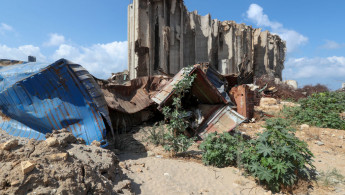Lebanese MP blocks port investigation in bid to stall for judicial immunity
Lebanese Judge Tarek Bitar, who leads the investigation into the Beirut port explosion, has been forced to suspend his investigation after a former minister filed a request to have the judge removed from the case.
Former Interior Minister and current MP Nouhad Machnouk asked the Court of Appeals to remove Bitar from the case, alleging that the judge has a political bias.
Bitar is the second appointee to lead the investigation into the 4 August 2020 port explosion which killed over 214 people and wounded at least 6,500. His predecessor, Fadi Sawan, was also removed from the investigation after two MPs he indicted asked for his recusal.
The request comes at a critical moment for the investigation, as - unlike the last 13 months - Lebanese officials and MPs do not currently have judicial immunity. They will not have immunity restored until 19 October, when parliament is back in session.
"We were expecting this to happen. We’re not living in a state, we’re living in a playground run by the mafia"
"After 19 October, judge Bitar needs an authorisation from the Parliament to be able to summon the [MPs]," Ghida Frangieh, a lawyer at Lebanese NGO Legal Agenda, told The New Arab.
"The main purpose of this request is to immediately suspend the investigation and to win time until they regain their immunity," Frangieh said.
Bitar has taken full advantage of the window of opportunity. He has requested the questioning of former PM Hassan Diab, who avoided his date of questioning by traveling to the US. He also requested the interrogation of former cabinet and current security officials, which led to the current campaign against him.
In recent days, local Lebanese media have circulated reports about Bitar being aligned with foreign interests. He reportedly has also been threatened by top Hezbollah officials should his investigation not bear results to their liking.
|
There are four similar requests currently being filed against Bitar by MPs and officials targeted in his investigation. Unlike the other three motions, Machnouk's complaint is only filed through the Court of Appeals, which immediately halts the investigation.
The announcement of the suspension of the investigation was met with outrage, as Lebanese saw it as just another attempt by the political class to evade accountability.
The country is notorious for the lack of justice, with civil war-era militia leaders not only escaping punishment but leading Lebanon's governments for decades after.
"We were expecting this to happen. We're not living in a state, we're living in a playground run by the mafia," Ibrahim Hoteit, the spokesperson for the families of the victims of the Beirut port explosion, told The New Arab.
"We will give the court of appeals a chance to give us our rights. If they decide to remove [Bitar], we won't be able to keep using peaceful methods like we did before," Hoteit added.
The legal action is the most recent - and most serious - attempt by the Lebanese political class to obstruct the investigation.
Ministers refused to lift the judicial immunity of parliamentarians over the summer despite protests.
MPs also attempted to create a parallel investigation into the explosion - widely deemed to be an attempt to neutralise Bitar’s investigation.
Last month, the Beirut Bar Association filed a motion to remove the general prosecutor in the explosion case, Ghassan Khoury, for not being impartial in the investigation. Khoury is the one who will be filing charges against indicted defendants based on Bitar's investigation.
Khoury had previously investigated the ammonium nitrate in the port and failed to take the necessary decision to have it removed. He could also be implicated in the case for this, making his role as a prosecutor in the case problematic.
"The prosecutor has taken a stand for the immunity of ministers, and he has delayed notifying the defendants of their hearing," Frangieh said.
Bitar's investigation will be put on ice until the Court of Appeals rules on the case, but it is impossible to estimate if this ruling will come before 19 October.
There are many plaintiffs and defendants, and all need to be notified before going to the court—procedures which threatens to keep Bitar from progressing in his investigation.





 Follow the Middle East's top stories in English at The New Arab on Google News
Follow the Middle East's top stories in English at The New Arab on Google News
![The UAE is widely suspected of arming the RSF militia [Getty]](/sites/default/files/styles/image_330x185/public/2024-11/GettyImages-472529908.jpg?h=69f2b9d0&itok=Yauw3YTG)
![Netanyahu furiously denounced the ICC [Getty]](/sites/default/files/styles/image_330x185/public/2024-11/GettyImages-2169352575.jpg?h=199d8c1f&itok=-vRiruf5)
![Both Hamas and the Palestinian Authority welcomed the ICC arrest warrants [Getty]](/sites/default/files/styles/image_330x185/public/2024-11/GettyImages-2178351173.jpg?h=199d8c1f&itok=TV858iVg)